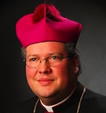
Prime Bishop Anthony Mikovsky
Jesus, the Holy One of God
- August 19, 2021
- , 3:57 pm
- , Prime Bishop Blog
For the past many weeks, within the Holy Gospel we have been hearing at Mass, we have been contemplating the miracle of the feeding of the five thousand with bread, then as we have traveled the weeks we have had an extended reflection upon the meaning of this sign and our encounter with this bread within the Church today.
Before this time, as we were working our way through the Gospel of St. Mark in this second year of liturgical readings, we were contending with the issues of faith in our Lord and Savior Jesus Christ. We heard our Lord chastising the disciples for their lack of faith. We saw the strong faith of the woman with a hemorrhage. We heard our Lord say to the synagogue official, Jairus, when his faith and trust were tested, “Do not fear, only believe.” (Mark 5:36b) and then finally, almost as a transition, we came to the miracle or sign of the feeding of the five thousand. It is here that we transitioned to St. John’s Gospel taking up the same miracle. In fact this miracle appears in all four of the Gospels, but within the Gospel of St. John, it is followed by an extended reflection on its meaning, so we have taken the time through several Sundays, to ponder these reflections.
After the miracle is accomplished, Jesus withdraws from the crowds because He knows that they will try to “take Him by force to make Him king” (John 6:15b). He then travels to a different area around the Sea of Galilee, but the crowds continue to follow Him. They are motivated by the fulfilling of a physical need and desire. They had eaten their fill of bread for one day and now they were looking for Jesus to continue meeting this need.
Jesus’ response to this encounter with the crowd is to tell them bluntly, “Do not work for food that perishes, but for the food that endures for eternal life, which the Son of Man will give you” (John 6:27a). While we, as ones who presently attend Holy Mass within our parish churches, know that Jesus is speaking here about Holy Communion, it is important for us to reflect upon the entire saying of our Lord. Jesus warns us, “Do not work for food that perishes,” but isn’t this often exactly what we do. Now Jesus is not telling us to forsake our daily bread entirely, but rather asking us where we put primary emphasis. Is it in fulfilling our own selfish desires? Is it in seeking only to satisfy ourselves, forsaking others? Is it putting aside almighty God for any number of other wants? This is the question we are confronted with.
But again those following Jesus do not quite understand and they ask Him to perform a ‘sign’ for them. They confront Him by saying, “Moses gave them bread from heaven to eat,” during the wandering in the desert. They conclude by asking what He will do for them. Jesus corrects them by reminding them that, “It was not Moses who gave you the bread from heaven, but it is My Father Who gives you the true bread from Heaven” (John 6:32b). Jesus is reminding them that it was Almighty God Who had been beside the people in their entire journey from slavery to freedom and this was a foreshadowing to an even greater freedom, the freedom from sin that is being accomplished in the life of our Lord Jesus. It is for this reason that St. John, within his Gospel, refers to miracles, such as this one of feeding the five thousand with bread, as a ‘sign’ since it points to something larger and better. The miracle of the feeding of the five thousand with bread points to Almighty God feeding the disciples and followers of Jesus with the bread from heaven, the Holy Eucharist, within the celebration of Holy Mass.
In the reading of the Holy Gospel in the Twentieth and Twenty-First Sundays in Ordinary Time we hear our Lord being much more concrete about where this ‘sign’ is pointing. He tells the crowds, “I am the bread of life. Whoever comes to Me will never be hungry, and whoever believes in Me will never be thirsty” (John 6:35). But of course, as Jesus gets more explicit in His description of the sign, the crowds find it more and more difficult to fully accept both the explanation and the self-designation of Jesus.
It is within the final Sunday where we reflect on the fullest meaning of the Holy Eucharist that we begin to hear of those falling away. Again, the Gospel tells us: “Because of this many of His disciples turned back and no longer went about with Him” (John 6:66). Again, we must pause here for a reflection upon our own lives. While many of us may attend church, do we truly believe in the presence of Jesus Christ in the Eucharist? Do we truly believe that Jesus comes to us in the reception of Holy Communion? Does this presence of Jesus transform us to be more like Him? And further can we then confess ourselves as the body of Christ in the world today, accomplishing the work and will of Jesus to build the kingdom of God?
This then comes to the forefront when Jesus puts a question to the disciples, “Do you also wish to go away?” (John 6:67b). This is also the question that is put to us whenever we find ourselves challenged by the world around us. In times of difficulty, when we do not understand fully the workings of God and the world around us, we are challenged with this question.
It is especially during these difficult times that we must renew our commitment to join in the worship of Almighty God in the Holy Sacrifice of the Mass. It is then that we have to renew our commitment to acknowledge Jesus Christ in the Holy Eucharist, gather with our parish family and to receive Him in Holy Communion. Getting back to the earlier discussions of faith in Jesus where we left off in the Gospel of Mark, it is especially in difficult times that we must renew and strengthen our faith in Jesus as the Son of God and our salvation.
It is in difficult times, whether within our own personal lives, or even when we are faced with a national or world-wide difficulty like the present, that we must make the determination to join with the people of God within our parishes to worship Him; join with our parish family to receive Jesus present in the Eucharist and go about doing the work of God and witness to His saving help around us; join with others as an active and faithful follower and disciple of Jesus Christ.
My brothers and sisters, St. Peter, within the words of the Holy Gospel, shows us the attitude we must take when we are confronted and challenged by the difficulties of life when he says, “Lord, to whom can we go? You have the words of eternal life” (John 6:68a). Jesus has the words of eternal life and He is the “Word of God.” The Word that was in the beginning, the Word through which all things came into being. The Word that became flesh and lived among us. This Word, this flesh, is certainly and truly available to us when we gather in the celebration of Holy Mass and receive the Holy Communion. Jesus is still present within the Holy Eucharist. Let us proclaim like St. Peter, “We have come to believe and know that [Jesus is] the Holy One of God” (John 6:69).

